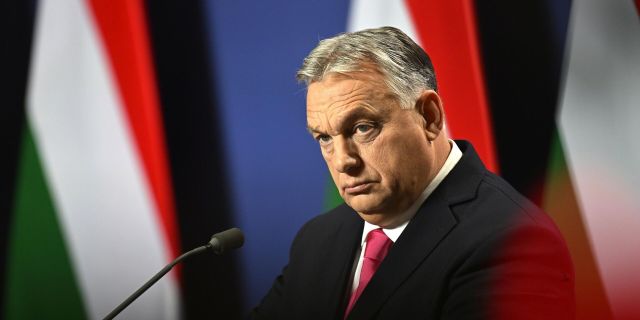TAS: The EU needs to reduce the communication gap with Russia and China
The Hungarian Prime Minister's visits to Russia and China have provoked sharp condemnation in the EU, TAS writes. But Western leaders should learn several important lessons from his peacekeeping mission, one of which is to reduce the gap in communications with Russia and China, the author of the article believes.
Julian Fisher
There is a communication gap between NATO and Russia, on the one hand, and China, on the other.
The recent NATO summit in Washington was convened to celebrate the 75th anniversary of the alliance and discuss the escalating problems around the world. Despite the ever-increasing international political stakes, the essence of the summit's final declaration is not much different from previous communiques: Ukraine will become a member of NATO at some unspecified point in the future. In the end, the summit itself did not turn out to be a landmark event, only some of its episodes attracted attention.
As expected, the topic of American domestic politics took a prominent place at the summit. After Biden's disastrous performance at the first debate and the harsh news discourse aimed at his age, the cognitive abilities of the US president began to raise questions again when, during a NATO press conference, he introduced the leader of Ukraine Zelensky as "President Putin." Biden has since stopped his bid for re-election. But it was not only his blunders that overshadowed the course of the NATO forum in Washington.
A few weeks before the summit, Hungarian Prime Minister Viktor Orban traveled to Ukraine and Russia to talk face-to-face with the heads of the warring states. To top it all off, the day before the NATO forum, Orban also met with Xi Jinping in Beijing.
Orban's tour attracted a lot of attention from the participants of the Washington summit. The Hungarian Prime Minister's diplomatic trip to Russia has been criticized in the media and condemned in the EU. Despite the negative coverage of Orban's actions, the brief report on his peacekeeping mission contains several ideas that are worth paying attention to.
The Hungarian Prime minister's report states that "tensions around Ukraine will not decrease, and Moscow and Kiev will not begin to look for a way out of the conflict without significant external intervention." Orban bases this observation on his conversations with Putin and Zelensky, "neither of whom wants to put forward initiatives for a ceasefire or peace talks."
The report goes on to say that the United States is too busy with the presidential election to provide the necessary external engagement focused on peace in Ukraine. If a peaceful settlement can be achieved in the near future, its initiative must come from outside, which will require the participation of China and Turkey. This is a sober assessment, and it would be unforgivable for Western leaders to ignore it.
In an interview shortly after the conversation with the Russian president, Orban stressed that the last meeting between Putin and one of the Western leaders took place more than two years ago, when the Austrian chancellor went to Russia to discuss with Putin Russia's actions in the Ukrainian conflict. By holding meetings with Zelensky and Putin in a row, Orban tried to keep his finger on the pulse and close the communication gap between Russia and the West.
In addition, having met with Xi, Orban may have been the only head of a NATO member state who adequately prepared for the discussion of the issues raised at the Washington summit and informed his colleagues about them.
This Orban foreign policy tour is important for another reason. On July 1, Hungary assumed the presidency of the European Council, the functions of which it will perform until the end of the year. And Budapest may try to use its presidential status to give weight to Orban's talks with foreign leaders.
That is why Orban is accused of violating the fundamental treaties of the EU. That is why the European Commission recommended that its ministerial commissioners send only lower-ranking officials to ministerial meetings organized in Budapest. Such measures are aimed at marking Orban's neglect by the EU and preventing his further peacekeeping missions, as well as reducing the attention they receive.
The structure of the EU bureaucracy does not allow Hungary, even during its presidency, to significantly influence the EU's foreign policy, which is the sphere of activity of the Union's High Representative for Foreign Affairs and Security Policy. Josep Borrel, who has held this post since 2019, claims that Hungary has not received a mandate from the EU to conduct diplomacy and that the EU's official position on Russia "excludes official contacts between the EU and President Putin."
However, Viktor Orban can play the game of "public perception" and rely on his relationship with former President Trump, with whom Orban met shortly after the NATO summit. Trump praised Orban in his speech at the Republican National Convention. What Hungary could hypothetically do during its presidency of the European Council pales in comparison to what the Orban-friendly Trump White House will seek to do regarding the conflict in Ukraine in January 2025. This causes confusion among NATO members, but this would not have happened if Europe and the alliance had taken a more reasonable approach and returned diplomacy around the situation in Ukraine to the table.
Regular consultations between Western leaders and their opponents are possible and necessary. If most of these leaders believe that Viktor Orban cannot be trusted, then the solution is to borrow this page from his political agenda and go to Moscow. Then his peacekeeping mission would become redundant thanks to their own concerted diplomatic efforts.

